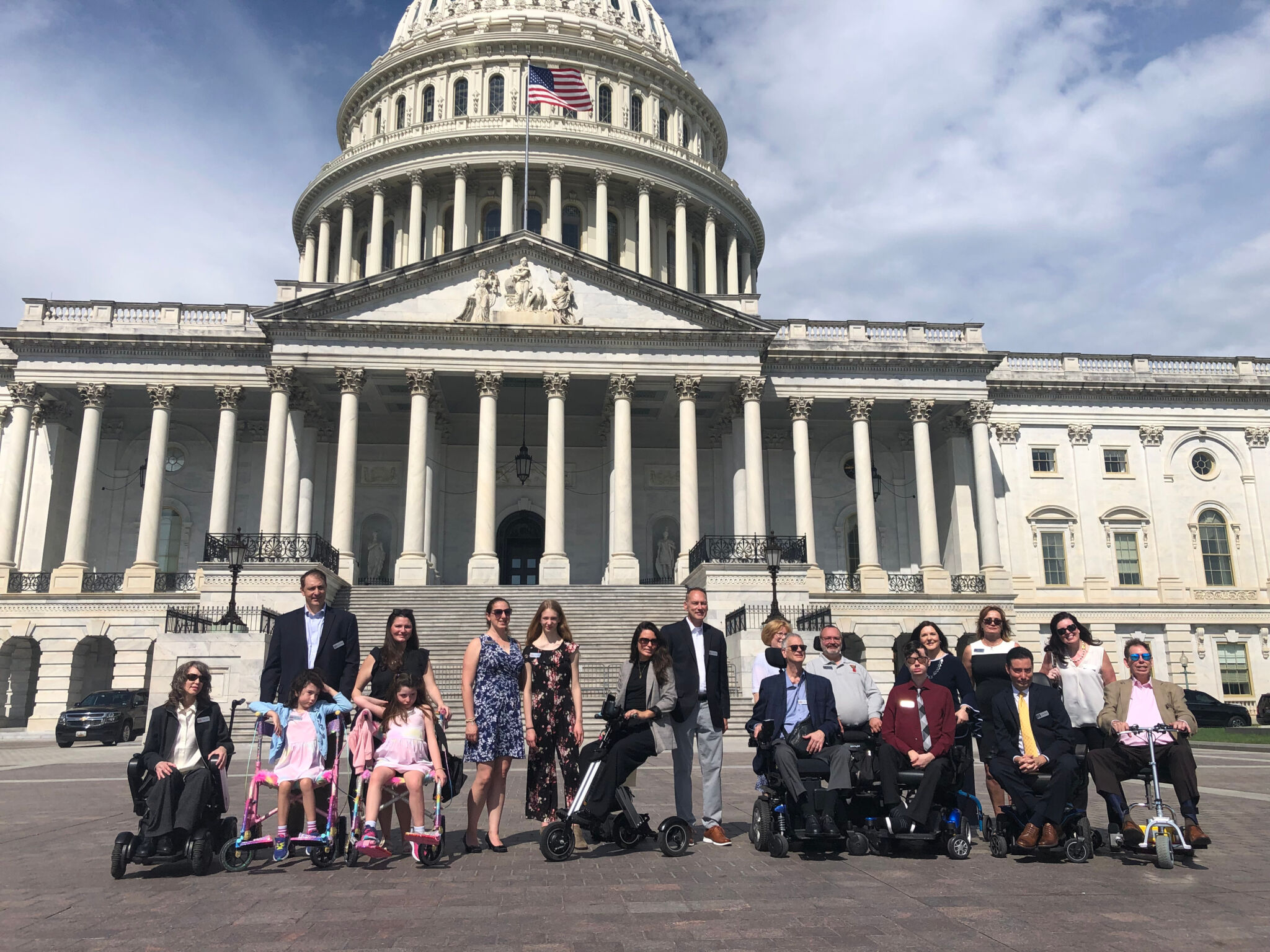It is crucial that FSHD voices are heard.
By engaging with elected officials, regulatory agencies, and government offices, we can make a big difference in getting treatments to families faster. Leveraging these networks to expand the awareness and understanding of FSHD, we can help source funding, build collaborations, and expedite review processes to break down barriers in drug development.
Current & Upcoming Initiatives
Advocate for FSHD Legislation
On May 8th, the FSHD Society held its first-ever Day on Capitol Hill in Washington, D.C. This milestone in our advocacy efforts brought together over a dozen individuals living with FSHD and their families from across the country to have their voices heard by legislators.
Our primary goal for this Hill Day was to advocate for FSHD awareness and policies that would significantly improve lives. We asked legislators to take action by signing on to our resolution recognizing June 20th as World FSHD Day. We’re excited to report that we were successful in getting sponsors for the resolution, and it will be introduced on June 18th! You can help by contacting your representatives today.
Enter your zip code into House.Gov to find your House Representative. Go to House.Gov >>
While many Representatives have automated contact forms on their pages, we recommend following Step 2 to ensure your message reaches your Representative and their staff.
Note: If multiple Representatives represent your zip code, you will be asked to use your home address.
Once you identify your Representative, contact Paula with KPM Group, a DC-based consulting group. Paula will provide you with the email for the Staff Member responsible for health issues.
If you do not hear back from KPM Group within a week, please send a follow up email.
Please CC Alex and Jake on your emails.
- Paula@KPMGroupDC.com
- Alex@KPMGroupDC.com
- Jake@KPMGroupDC.com
Customize the below email template to draft your email. Don't forget to attach the Resolution>>
Note: Since email can be a little clunky, we recommend writing your email in a separate word document. You can then copy and paste into your email.
You can download a Word.docx version of the email HERE>>
Items in BOLD and BRACKETS should be customized.
Dear [Staff Member],
My name is [INSERT NAME] and I [live with Facioscapulohumeral Muscular Dystrophy (FSHD)/am the parent/caregiver/loved one of someone with Facioscapulohumeral Muscular Dystrophy (FSHD)]. My family and I live in [INSERT CITY/STATE]. I am writing to request your support on the attached resolution recognizing June 20th as World FSHD Day.
FSHD is a genetic disorder that leads to the weakening of skeletal muscles. FSHD can spread to any muscle, but typically affects muscles in the face (facio), shoulders (scapula), upper arms (humerus), and legs or core. Symptoms of FSHD usually begin in the teenage years, although Early-Onset FSHD can begin as early as age 5.
While symptom may begin at an early age, diagnosis can take anywhere from a few months to 10 or more years. Around 20% of FSHers will need a wheelchair by age 50. Over 70% of FSHers experience debilitating pain and fatigue. Unfortunately, there is no effective treatment or cure - but there is hope.
[PLEASE ADD 1 OR MORE PARAGRAPHS: These paragraphs should add additional context on FSHD and your connection. For example: I was diagnosed with FSHD when I was XX years old. Living with FSHD has impacted my life...]
The resolution was introduced on June 18th by Representative Debbie Dingle (D-MI-6) with Rep. Mike Kelly (R-PA-16). We would love your office's support. If you are interested in co-sponsoring, please reach out to William Seabrook (william.seabrook@mail.house.gov) in Rep. Dingle's office.
I can be reached at [INSERT CONTACT INFORMATION].
I look forward to hearing from you soon! Thank you for your consideration.
Sincerely,
[YOUR NAME]

FDA Listening Session on Upper Body Mobility
Many of you will remember our pivotal Voice of the Patient Forum with the FDA in 2020. In a follow-up to that conversation, we are asking the FDA to hear our families’ stories on the challenges of living with upper-body weakness. A strong understanding of this aspect of FSHD will help the FDA review future potential treatments.
Day on Capitol Hill: May 8th, 2024
On May 8th, the FSHD Society held its first-ever Day on Capitol Hill in Washington, D.C. This milestone in our advocacy efforts brought together over a dozen individuals living with FSHD and their families from across the country to have their voices heard by legislators. Throughout the day, advocates engaged in 15 meetings with lawmakers and their staff, aiming to secure support and raise awareness about FSHD.
Our primary goal for this Hill Day was to bring attention to the unique challenges faced by people living with FSHD and to advocate for awareness and policies that would significantly improve lives. We asked
legislators to take action by signing on to our resolution recognizing June 20th as World FSHD Day. We’re excited to report that we were successful in getting sponsors for the resolution, and it will be introduced on June 18th!
On May 8th, we will advocate for the national designation of June 20th as World FSHD Day. Read the drafted resolution here. Contact your elected officials and ask for their support today!
Progress To Date
Our efforts have been met with success as the FSHD Society has achieved unprecedented visibility and attention for FSHD. Here are some examples of our advocacy milestones over the past decade:
Future Plans
Stay tuned for upcoming projects & campaigns! We have big plans, and we want your voice to be heard loud and clear.

